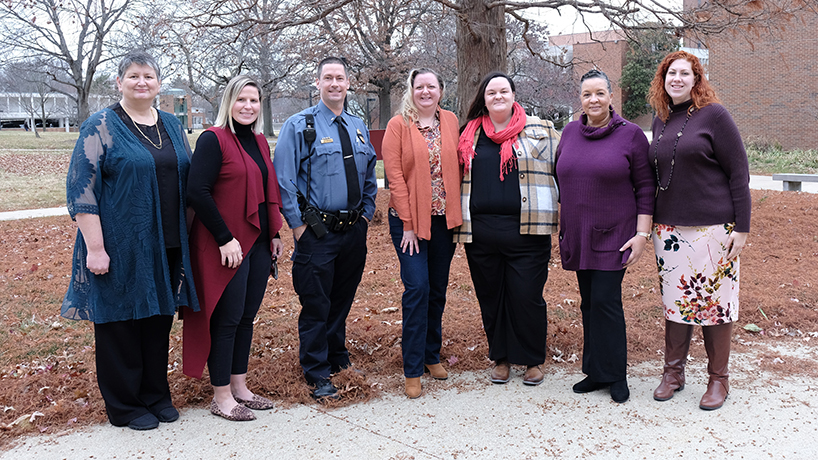
The 20-person Tritons United Coordinated Community Response Team includes (from left) Teaching Professor of English Lynn Staley, College of Nursing Associate Professor and Associate Dean of Research Kim Werner, Lt. David Woods, Project Coordinator Maggie Gross, Safe Connections Director of Crisis and Prevention Brigid Welsh, Title IX Coordinator and Chief Equity Officer Dana Beteet Daniels and Associate Director of Student Conduct and Academic Integrity Andrea Guimaraes and others. (Photo by August Jennewein)
Gender-based violence impacts one in three women, and college and university campuses, unfortunately, are no safe haven. But a new initiative at the University of Missouri–St. Louis hopes to get ahead of gender-based violence on UMSL’s campus.
Tritons United: Against Gender Based Violence, led by College of Nursing Associate Professor and Associate Dean of Research Kim Werner and Project Coordinator Maggie Gross, aims to reduce or eliminate gender-based violence on campus by creating or strengthening preventative and responsive policies and trainings.
“We realized we didn’t have anything that was specifically focused on gender-based violence prevention and programming,” Werner said. “It hasn’t been a big problem at UMSL, but some other area colleges were having issues, and we wanted to make sure that we were providing programming at our campus that would serve as prevention.”
The initiative is funded by a $300,000 Office of Violence Against Women campus grant from the United States Department of Justice. UMSL is one of 193 campuses currently receiving this funding.
Though the grant comes from the Department of Justice, it does not only fall into the realm of law enforcement. Instead, the program is survivor oriented.
“It’s to make sure that everybody knows there are resources out there on our campus, and we take it seriously,” Gross said. “We will respond, and we will listen, and we will want to do whatever is best for that person coming forward. Because it takes a lot for someone to come forward and say, ‘Hey, you know, this happened, and it was not OK’ and want to get more information.”
Werner and Gross began the initial planning year of Tritons United by assembling a Coordinated Community Response Team or CCRT of 20 members – UMSL students, faculty and staff or professionals in the field of gender-based violence from the St. Louis community – as well as a seven-person core CCRT.
That smaller group includes Gross, Title IX Coordinator and Chief Equity Officer Dana Beteet Daniels, UMSL Police Department Lt. David Woods, Teaching Professor of English Lynn Staley, Associate Director of Student Conduct and Academic Integrity Andrea Guimaraes, Safe Connections Director of Crisis and Prevention Brigid Welsh and Crime Victim Services Managing Attorney Katie Wessling.
The core CCRT meets monthly to create comprehensive, evidence-based prevention programs and other trainings and is tasked with engaging key partners both on and off UMSL campus, conducting campus assessments and evaluations, overseeing communication and managing the Tritons United campus strategic plan.
“The FULL CCRT also makes decisions and are also key players as they are the ones who are the early adopters of our Tritons United campus interventions and are the first to receive our Tritons United campus trainings and programming,” Gross said.
They began their efforts by conducting a campus needs assessment examining the policies and trainings that UMSL already had in place, such as a training for all incoming students titled “Not Anymore.”
The CCRT then developed a strategic plan forward and got set creating new materials such as bystander trainings, gender implicit bias training, law enforcement training, a faculty guidebook and a gender-based violence resource kit that includes all the available resources as well as materials so individuals can include education and prevention into the classroom.
“It serves as almost a menu of ‘here are the different resources available to me,’” Werner said, “If I access Title IX, this is what might happen. This is the kind of the path you’re going down if I access a police department. This is what happens if I talk to counseling services. It really helps people be empowered in what resources they are engaging with and to know exactly what might occur if they engage with those different resources.”
As it moves into its second year, Tritons United will begin the implementation process. Werner and Gross expect to roll out some trainings as well as the faculty guidebook and resource kit in January.
During the third year of the grant, the CCRT will continue implementation and do evaluations of the ongoing campus efforts. But Werner and Gross don’t expect the third year to be the final one for the program.
They plan to apply for another round of the grant with an eye toward continuous progress.
“Everyone has the right to feel safe,” Werner said. “Everyone should know that the university in which they’re affiliated is doing everything it possibly can to ensure their safety and make sure that everyone has equitable experience on campus. Everyone should feel supported and acknowledged. I think it’s our responsibility as faculty and staff to make sure that our students feel supported and welcomed.”
For more information on Tritons United, follow it on Facebook, Twitter, Instagram and TikTok at @umsltritonsunited or contact the organizers directly at umsltritonsunited@umsl.edu or 314-516-8488.














